Showing University's Strengths in Excellence Competition
Freiburg, Apr 19, 2017
Qualifying for inclusion in the excellence strategy of Germany's top research funding organization, the Deutsche Forschungsgemeinschaft (DFG), is no solo 100 meter sprint. It is a relay that requires painstaking, patient teamwork. Universities competing for a place within the excellence strategy must qualify through a series of procedures that begin in mid-2017 and continue until the end of 2018. But what potentials does the competition hold? Scholars at the University of Freiburg have their say on the issue.

Photo: Sandra Meyndt
Academics whose projects convince the excellence committee within the DFG's executive board and the German Council of Science and Humanities will profit from the largest funding package for top level research to-date. Competitors are vying for around 3.7 billion euros – 533 million euros annually – that Germany's federal and state governments are making available for the first seven years of its new excellence strategy. What is more, succeeding in the competition is expected to strengthen far more than research at the University of Freiburg. Experiences from the first two rounds of the excellence initiative show that these efforts have a positive effect on the institution's other main branches – from teaching to promotion of young academics and beyond to international networking.
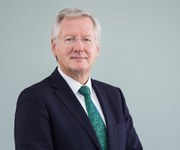 "Networks within the university and across sectors are what make us strong. And visionary networks are part of our outline for future institutional strategy, whether it is on the way to becoming a European Campus with other universities of the Upper Rhine region or a Smart City in cooperation with the city of Freiburg. The organizational center for all these efforts is our university. And university means university research. Research is the driving force, not just in laboratories and libraries, but in teaching as well. And teaching spurs on research, because we first speak in the classroom with our students and doctoral candidates about the latest methods, technologies and discoveries. Enduring capacities for renewal and innovative strength are founded on the creativity of our young scholars, from PhD students to junior research group leaders. They are the heart of our university and all our attention must be devoted to them. This defines the key to success in the coming excellence competition as follows: A researching university as an organizational center of existing, future and visionary networks within and beyond the university and between generations. Networks driven by scholarship that produce the answers for the challenges of the present and future around the world are our trademark, trinationally, and therefore European!"
"Networks within the university and across sectors are what make us strong. And visionary networks are part of our outline for future institutional strategy, whether it is on the way to becoming a European Campus with other universities of the Upper Rhine region or a Smart City in cooperation with the city of Freiburg. The organizational center for all these efforts is our university. And university means university research. Research is the driving force, not just in laboratories and libraries, but in teaching as well. And teaching spurs on research, because we first speak in the classroom with our students and doctoral candidates about the latest methods, technologies and discoveries. Enduring capacities for renewal and innovative strength are founded on the creativity of our young scholars, from PhD students to junior research group leaders. They are the heart of our university and all our attention must be devoted to them. This defines the key to success in the coming excellence competition as follows: A researching university as an organizational center of existing, future and visionary networks within and beyond the university and between generations. Networks driven by scholarship that produce the answers for the challenges of the present and future around the world are our trademark, trinationally, and therefore European!"
Prof. Dr. Hans-Jochen Schiewer, Rector (Photo: Silvia Wolf)
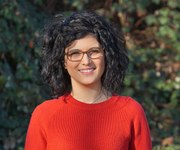 "In September 2016 I began doctoral work with Prof. Dr. Thomas Stieglitz, an executive committee member of BrainLinks-BrainTools. There I have been researching carbon-based materials for neural interfaces. I'm very grateful for the opportunity to study within the environment of this cluster of excellence. By taking part in meetings, presentations, retreats, conferences and other cluster events, I was able to establish a comprehensive network very quickly. I can share knowledge with many scholars from different disciplines and learn from them. Speaking, for example, with doctors or specialists in neuroethics is extremely helpful for my research. Cooperating with partners from outside the university is an asset for my work as well. In Freiburg I feel I am part of a much larger whole instead of being associated with just one topic or an individual project."
"In September 2016 I began doctoral work with Prof. Dr. Thomas Stieglitz, an executive committee member of BrainLinks-BrainTools. There I have been researching carbon-based materials for neural interfaces. I'm very grateful for the opportunity to study within the environment of this cluster of excellence. By taking part in meetings, presentations, retreats, conferences and other cluster events, I was able to establish a comprehensive network very quickly. I can share knowledge with many scholars from different disciplines and learn from them. Speaking, for example, with doctors or specialists in neuroethics is extremely helpful for my research. Cooperating with partners from outside the university is an asset for my work as well. In Freiburg I feel I am part of a much larger whole instead of being associated with just one topic or an individual project."
Maria Vomero, doctoral candidate at the Department of Mircosystems Engineering (MST)/BrainLinks-BrainTools (Photo: Levin Sotru)
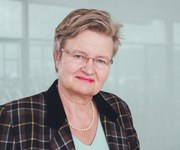 "The University of Freiburg values particularly highly synergies between research and teaching. The university's excellence initiative promotes and ensures that teaching is not only research-oriented, but that students are incorporated in research as ‘researching learners' starting right at the Bachelor's level. Teaching and learning profit in this way from the excellence competition because outstanding research makes outstanding learning possible."
"The University of Freiburg values particularly highly synergies between research and teaching. The university's excellence initiative promotes and ensures that teaching is not only research-oriented, but that students are incorporated in research as ‘researching learners' starting right at the Bachelor's level. Teaching and learning profit in this way from the excellence competition because outstanding research makes outstanding learning possible."
Prof. Dr. Juliane Besters-Dilger, Vice-President Academic Affairs (Photo: Sandra Meyndt)
 "Working at the BIOSS cluster of excellence, the Centre for Biological Signalling Studies, gave me an interesting environment, because BIOSS is a place where many disciplines come together. Yet at the same time, the emphasis is on understanding the signalling processes and contexts within cells. BIOSS is also involved in teaching, which was really important for me during my Master's. It enabled me to take part in a variety of courses during my studies and to interact with other working groups as well. At BIOSS I also completed my Master's project and wrote my thesis on it. Work here is international as well. You come into contact with a range of people who bring experience from all over the place. Taking regular seminars at BIOSS allows for regular exchange of information."
"Working at the BIOSS cluster of excellence, the Centre for Biological Signalling Studies, gave me an interesting environment, because BIOSS is a place where many disciplines come together. Yet at the same time, the emphasis is on understanding the signalling processes and contexts within cells. BIOSS is also involved in teaching, which was really important for me during my Master's. It enabled me to take part in a variety of courses during my studies and to interact with other working groups as well. At BIOSS I also completed my Master's project and wrote my thesis on it. Work here is international as well. You come into contact with a range of people who bring experience from all over the place. Taking regular seminars at BIOSS allows for regular exchange of information."
Asin Peighambari, Master's student of Biology/BIOSS Centre for Biological Signalling Studies (Photo: Sandra Meyndt)
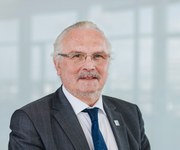 "In contrast with other aid programs of public funding organizations, the excellence competition is unique. Through a system of excellence clusters, it opens up opportunities for superior, scientific inquiry over longer periods of time and from different perspectives, as well as laying the foundation for setting up new professorships. The last excellence initiative showed that in this way, structures can be created that sustainably shape the university, making it more attractive and enriching instruction as well. I expect no less from success in the current competition."
"In contrast with other aid programs of public funding organizations, the excellence competition is unique. Through a system of excellence clusters, it opens up opportunities for superior, scientific inquiry over longer periods of time and from different perspectives, as well as laying the foundation for setting up new professorships. The last excellence initiative showed that in this way, structures can be created that sustainably shape the university, making it more attractive and enriching instruction as well. I expect no less from success in the current competition."
Prof. Dr. Gunther Neuhaus, Vice Rector and Vice-President for Research (Photo: Sandra Meyndt)
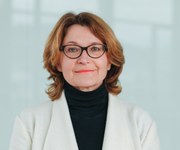 "We expect impetus for equality and diversity from the excellence strategy. We hope that the demanding standards of this competition support us as we implement greater equality of opportunity and research of diversity and gender into other lines of academic inquiry. We expect bridging between gender theory and the implementation of equality as well as strengthening of the university's family-friendliness, internationality and diversity. The new excellence strategy can contribute to affecting a cultural shift which will enable us to approach in full awareness of our responsibility challenges within the university and society."
"We expect impetus for equality and diversity from the excellence strategy. We hope that the demanding standards of this competition support us as we implement greater equality of opportunity and research of diversity and gender into other lines of academic inquiry. We expect bridging between gender theory and the implementation of equality as well as strengthening of the university's family-friendliness, internationality and diversity. The new excellence strategy can contribute to affecting a cultural shift which will enable us to approach in full awareness of our responsibility challenges within the university and society."
Prof. Dr. Gisela Riescher, Vice-President for Research Integrity, Gender and Diversity (Photo: Sandra Meyndt)
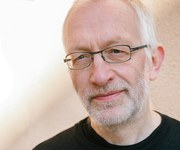 "The decision of policymakers to provide above average support for a few universities will change the landscape of higher education in Germany in a lasting way. Whether that is positive remains to be seen. With an eye on the future, however, it would be inadvisable for the university not to take part in the competition based on considerations of principle. Instead, the university should see it as a chance for further development and use it as such. And I don't so much mean further development with respect to research topics, for example, but at the level of communication within the university. Additional efforts, and these are manifold within the context of excellence, demand a culture of intensive discourse. Just the complexity of the issues that must be addressed makes this clear (e.g. application, increased employee workload, coordination processes). That is why I believe it essential that the application process be accompanied by a variety of discussion formats involving all those who have an interest in it."
"The decision of policymakers to provide above average support for a few universities will change the landscape of higher education in Germany in a lasting way. Whether that is positive remains to be seen. With an eye on the future, however, it would be inadvisable for the university not to take part in the competition based on considerations of principle. Instead, the university should see it as a chance for further development and use it as such. And I don't so much mean further development with respect to research topics, for example, but at the level of communication within the university. Additional efforts, and these are manifold within the context of excellence, demand a culture of intensive discourse. Just the complexity of the issues that must be addressed makes this clear (e.g. application, increased employee workload, coordination processes). That is why I believe it essential that the application process be accompanied by a variety of discussion formats involving all those who have an interest in it."
Dr. Helmut Waller, Chairman of the Staff Council (Photo: Sandra Meyndt)
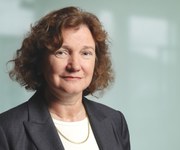 "Excellent subject knowledge combined with interdisciplinary thought allows us to answer the questions of the future. Yet within the context of the dialogue between university and society, the university bears responsibility for the regional and global innovation system. We enable everyone at the university to make innovative ideas into products. We selectively promote profitable application of our research results. The university considers itself a founding university. This perception is based here on three, firmly anchored pillars: teaching, consulting and coaching. Comprehensive education and further education, beyond the university, in entrepreneurship from Bachelor's to Master's to PhD, and further education of employees set a foundation for an active application strategy in people's heads. Building on the successes of recent years, we will continue to extend our expertise with the expansion of the Center for Technology Transfer (ZFT), making it into a Freiburg-based innovation service that concentrates activities within and outside of the university as well as creating effective, university-based support for innovation and transfer."
"Excellent subject knowledge combined with interdisciplinary thought allows us to answer the questions of the future. Yet within the context of the dialogue between university and society, the university bears responsibility for the regional and global innovation system. We enable everyone at the university to make innovative ideas into products. We selectively promote profitable application of our research results. The university considers itself a founding university. This perception is based here on three, firmly anchored pillars: teaching, consulting and coaching. Comprehensive education and further education, beyond the university, in entrepreneurship from Bachelor's to Master's to PhD, and further education of employees set a foundation for an active application strategy in people's heads. Building on the successes of recent years, we will continue to extend our expertise with the expansion of the Center for Technology Transfer (ZFT), making it into a Freiburg-based innovation service that concentrates activities within and outside of the university as well as creating effective, university-based support for innovation and transfer."
Prof. Dr. Margit Zacharias, Vice-President for Innovation and Technology Transfer (Photo: private)
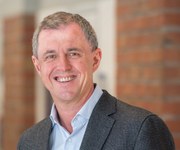 "The Freiburg Institute for Advanced Studies (FRIAS) already contributes to the shaping of the university's image and its strategic development in many respects. The FRIAS promotes outstanding research in Freiburg with individual fellowships and a variety of group formats. The group formats, are especially well-suited to supporting new research areas in all disciplines at early stages in their development. As a start, success in the excellence strategy for FRIAS will widen its scope of activities. On the one hand, it would be possible for us to incorporate top researchers in Germany in research groups composed of academics from the University of Freiburg. On the other hand, it would specifically allow FRIAS to offer junior researchers from the experimental sciences long-term fellowships of two to three years duration. If the University of Freiburg is successful in the excellence strategy, the Institute will also continue to be incorporated in the excellence clusters and, among other things, organize and an academy program on excellence cluster topics in order to link and invite to Freiburg promising young researchers from all over the globe."
"The Freiburg Institute for Advanced Studies (FRIAS) already contributes to the shaping of the university's image and its strategic development in many respects. The FRIAS promotes outstanding research in Freiburg with individual fellowships and a variety of group formats. The group formats, are especially well-suited to supporting new research areas in all disciplines at early stages in their development. As a start, success in the excellence strategy for FRIAS will widen its scope of activities. On the one hand, it would be possible for us to incorporate top researchers in Germany in research groups composed of academics from the University of Freiburg. On the other hand, it would specifically allow FRIAS to offer junior researchers from the experimental sciences long-term fellowships of two to three years duration. If the University of Freiburg is successful in the excellence strategy, the Institute will also continue to be incorporated in the excellence clusters and, among other things, organize and an academy program on excellence cluster topics in order to link and invite to Freiburg promising young researchers from all over the globe."
Prof. Dr. Bernd Kortmann, Director of the Freiburg Institute for Advanced Studies (FRIAS) (Photo: Roger Koeppe)
 I"I decided to do a PhD because I'm pursuing an academic career. What's needed for that is not the ability to use a pipette on an assembly line, but personal maturity and the mastery of key competencies. Seminars and meetings allowed me to successfully establish cooperation with others and have scientifically advanced my project significantly. Particularly beyond the laboratory, the Spemann Graduate School of Biology and Medicine offers training that exposes you to an international, multi-disciplinary environment, which helps along the way to getting from being student to a post-doctoral fellow. By interacting with fellow students, professors in Freiburg, and guest lecturers, it was possible for me to build up a lasting, academic network – a major step on the way to my own working group."
I"I decided to do a PhD because I'm pursuing an academic career. What's needed for that is not the ability to use a pipette on an assembly line, but personal maturity and the mastery of key competencies. Seminars and meetings allowed me to successfully establish cooperation with others and have scientifically advanced my project significantly. Particularly beyond the laboratory, the Spemann Graduate School of Biology and Medicine offers training that exposes you to an international, multi-disciplinary environment, which helps along the way to getting from being student to a post-doctoral fellow. By interacting with fellow students, professors in Freiburg, and guest lecturers, it was possible for me to build up a lasting, academic network – a major step on the way to my own working group."
Dr. Florian Haun of the Spemann Graduate School of Biology and Medicine (SGBM) has received his PhD and is working as a postdoctoral researcher at the Institute of Molecular Medicine and Cell Research (Photo: private)
Excellence Site
http://www.exzellenz.uni-freiburg.de/en

